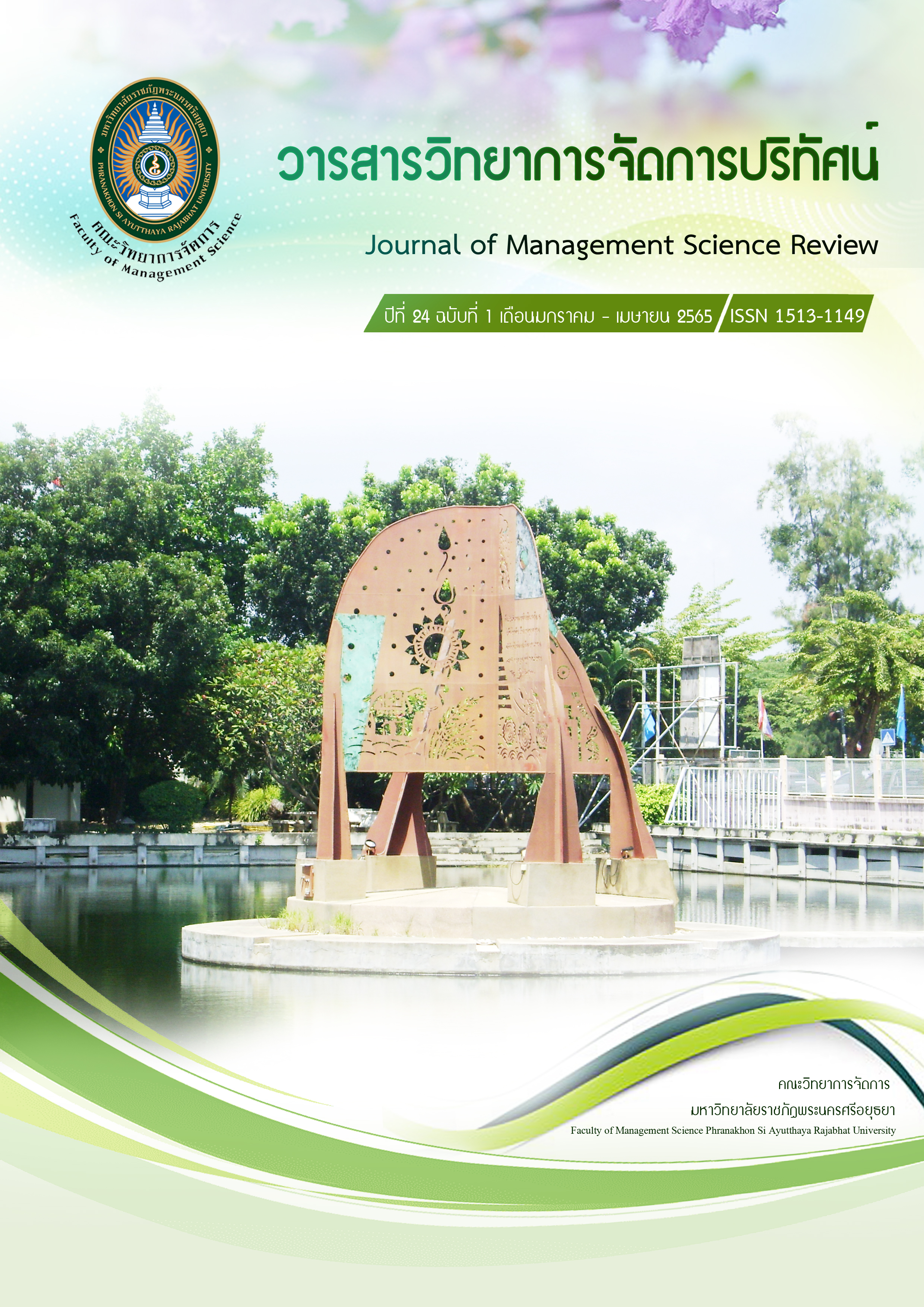An Effect Caused by the Outbreak of Coronavirus (COVID-19) and the Survival Strategies of Food & Beverage Business.
Keywords:
Effect, Survival Strategies, Food and Beverage Business, Outbreak of Coronavirus (COVID-19) SituationAbstract
The outbreak of Coronavirus (COVID-19) which has been prolonged for more than 2 years has extensively affected food & beverage business. The business had to be closed for a period of time due to the government measures although the restriction has been loosened and food delivery has been allowed. There has been a strongly affected on this kind of business though. The entrepreneurs, consequently, must plan their new competitive strategy in order to fit into the situation. The purposes of this article were to investigate the effect on food & beverage business caused by Coronavirus, and to examine the survival strategy employed by food & beverage business in order to survive in this severe situation. The value expansion rate of full-service restaurants during the same period of time was compared and found a little higher or 0.7% today than that of last year. However, the value expansion rate of limited-service restaurants and street food has increased to 2.4% and 2.0%, respectively. These two kinds of service were small in size so they could easily adapt themselves better than those large in size. The survival strategies recommended for food & beverage business entrepreneurs included compact size; mobility to reach the target group; flexibility should be combined; cost leadership strategy or cost focus strategy were also suggested in order to reduce an overall cost and change to an appropriate operation.
References
กรมพัฒนาธุรกิจการค้า. (2564). บทวิเคราะห์ธุรกิจครึ่งปีแรก 2564 (มกราคม-มิถุนายน 2564). กรุงเทพฯ: ผู้แต่ง.
ญาณิศา เผื่อนเพาะ. (2561). ประเภทของร้านอาหาร กับคุณลักษณะผู้ประกอบการที่ประสบความสำเร็จในจังหวัดพระนครศรีอยุธยา. Veridian E Journal ฯ สาขามนุษยศาสตร์ สังคมศาสตร์ และศิลปะ, 11, 303-321.
เบญจมาส เปาะทอง. (2561). การจัดการเชิงกลยุทธ์. (พิมพ์ครั้งที่ 5). สุราษฎร์ธานี: มหาวิทยาลัย ราชภัฎสุราษฎร์ธานี.
ประภัสสร รังสิโรจน์. (2563). ปัจจัยที่มีอิทธิพลต่อความสำเร็จในการพัฒนาธุรกิจร้านอาหารไทยอย่างยั่งยืน. วารสารสันติศึกษาปริทรรศน์, 8, 2138-2150.
ไมเคิล อี พอร์เตอร์. (2565). ไมเคิล อี พอร์เตอร์. ค้นเมื่อ 12 เมษายน 2565, จาก https://groups.google.com/group/RSU_MBA9/attach/88594541e1ab7cb9/Michael_E_Porter.doc?part=0.2
วิกฤติร้านอาหาร บนมาตรการรัฐที่ไม่แน่นอน. (2564). กรุงเทพธุรกิจ. ค้นเมื่อ 23 ตุลาคม 2564, จาก https://www.bangkokbiznews.com/business/953712
วิพุธ อ่องสกุล. (2557). กลยุทธ์คืออะไร. กรุงเทพฯ:
บัวเงิน.
วิลเลน, โทมัส แอล, ฮังเกอร์, เจ เดวิท, ฮอฟฟ์แมน, อลัน เอ็ม และ แบมฟอร์ด, ชาร์ล อี. (2560). การจัดการเชิงกลยุทธ์ = Strategic management and business policy (วิรัช สงวนวงศ์วาน, ผู้แปล). กรุงเทพฯ: ท้อป.
ศูนย์วิจัยกสิกร. (2563). ธุรกิจอาหารปี 2564 ยังมีความเสี่ยงและความท้าทายสูง การเติบโตบนความเปราะบาง การลงทุนในธุรกิจยังคงต้องระมัดระวัง. ค้นเมื่อ 2 ตุลาคม 2564, จาก https://www.kasikornresearch.com/InfoGraphic/Documents/z3175.pdf?fbclid=IwAR2BfDfv7wrHuDhc8AdfcZGexVuX8__lj-UaTURPl4nUdLDKIOPpThml0MM
สิทธิชัย ธรรมเสน่ห์.(2564). รูปแบบการบริหารจัดการธุรกิจร้านอาหารในยุคปกติวิถีใหม่สำหรับผู้ประกอบการ. กรุงเทพฯ: มหาวิทยาลัยราชภัฏสวนสุนันทา.
สำนักงานส่งเสริมวิสาหกิจขนาดกลางและขนาดย่อม. (2564). บทวิเคราะห์สถานการณ์ SME:
บทวิเคราะห์สถานการณ์และบทวิเคราะห์ธุรกิจ MSME รายสาขาธุรกิจ (Quick study) ปี 2564: บทวิเคราะห์ธุรกิจ MSME สาขาธุรกิจร้านอาหาร. ค้นเมื่อ 23 ตุลาคม 2564, จาก https://www.sme.go.th/upload/mod_download/download-20210909160132.pdf
อำพล นววงศ์เสถียร. (2562). การจัดการเชิงกลยุทธ์ การแสวงหาความได้เปรียบในการแข่งขัน. (พิมพ์ครั้งที่ 5). กรุงเทพฯ: วิทยาลัยเซาธ์





